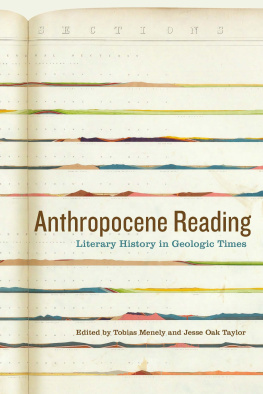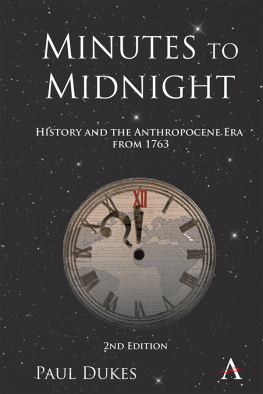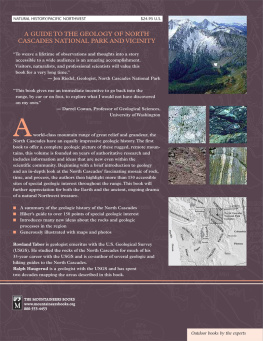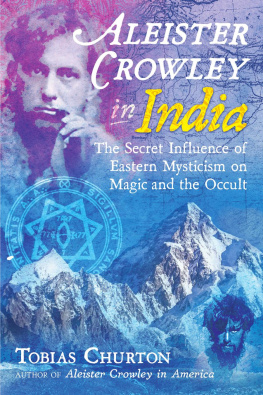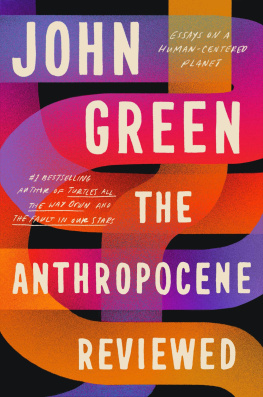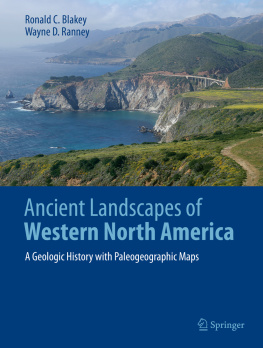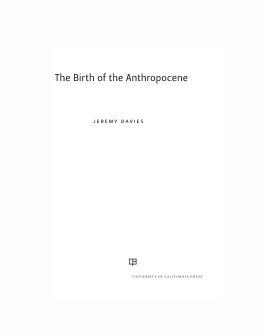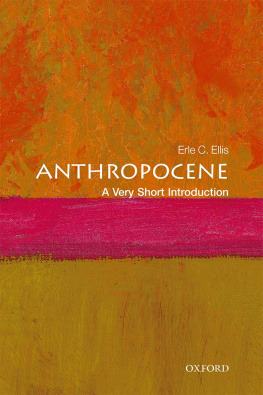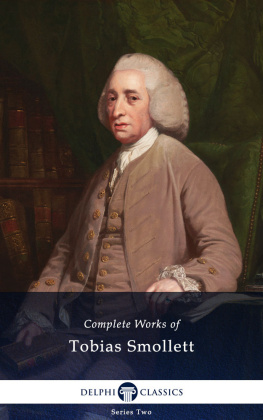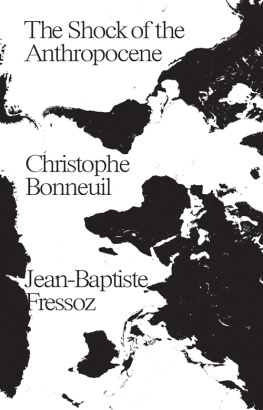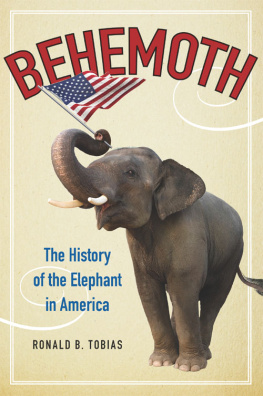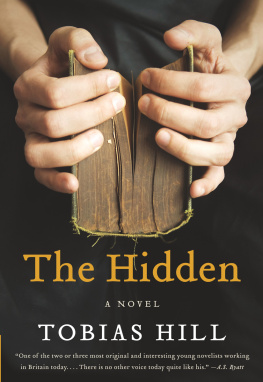Tobias Menely - Anthropocene Reading : Literary History in Geologic Times
Here you can read online Tobias Menely - Anthropocene Reading : Literary History in Geologic Times full text of the book (entire story) in english for free. Download pdf and epub, get meaning, cover and reviews about this ebook. year: 2017, publisher: The Pennsylvania State University Press, genre: Art. Description of the work, (preface) as well as reviews are available. Best literature library LitArk.com created for fans of good reading and offers a wide selection of genres:
Romance novel
Science fiction
Adventure
Detective
Science
History
Home and family
Prose
Art
Politics
Computer
Non-fiction
Religion
Business
Children
Humor
Choose a favorite category and find really read worthwhile books. Enjoy immersion in the world of imagination, feel the emotions of the characters or learn something new for yourself, make an fascinating discovery.
- Book:Anthropocene Reading : Literary History in Geologic Times
- Author:
- Publisher:The Pennsylvania State University Press
- Genre:
- Year:2017
- Rating:5 / 5
- Favourites:Add to favourites
- Your mark:
- 100
- 1
- 2
- 3
- 4
- 5
Anthropocene Reading : Literary History in Geologic Times: summary, description and annotation
We offer to read an annotation, description, summary or preface (depends on what the author of the book "Anthropocene Reading : Literary History in Geologic Times" wrote himself). If you haven't found the necessary information about the book — write in the comments, we will try to find it.
Anthropocene Reading : Literary History in Geologic Times — read online for free the complete book (whole text) full work
Below is the text of the book, divided by pages. System saving the place of the last page read, allows you to conveniently read the book "Anthropocene Reading : Literary History in Geologic Times" online for free, without having to search again every time where you left off. Put a bookmark, and you can go to the page where you finished reading at any time.
Font size:
Interval:
Bookmark:
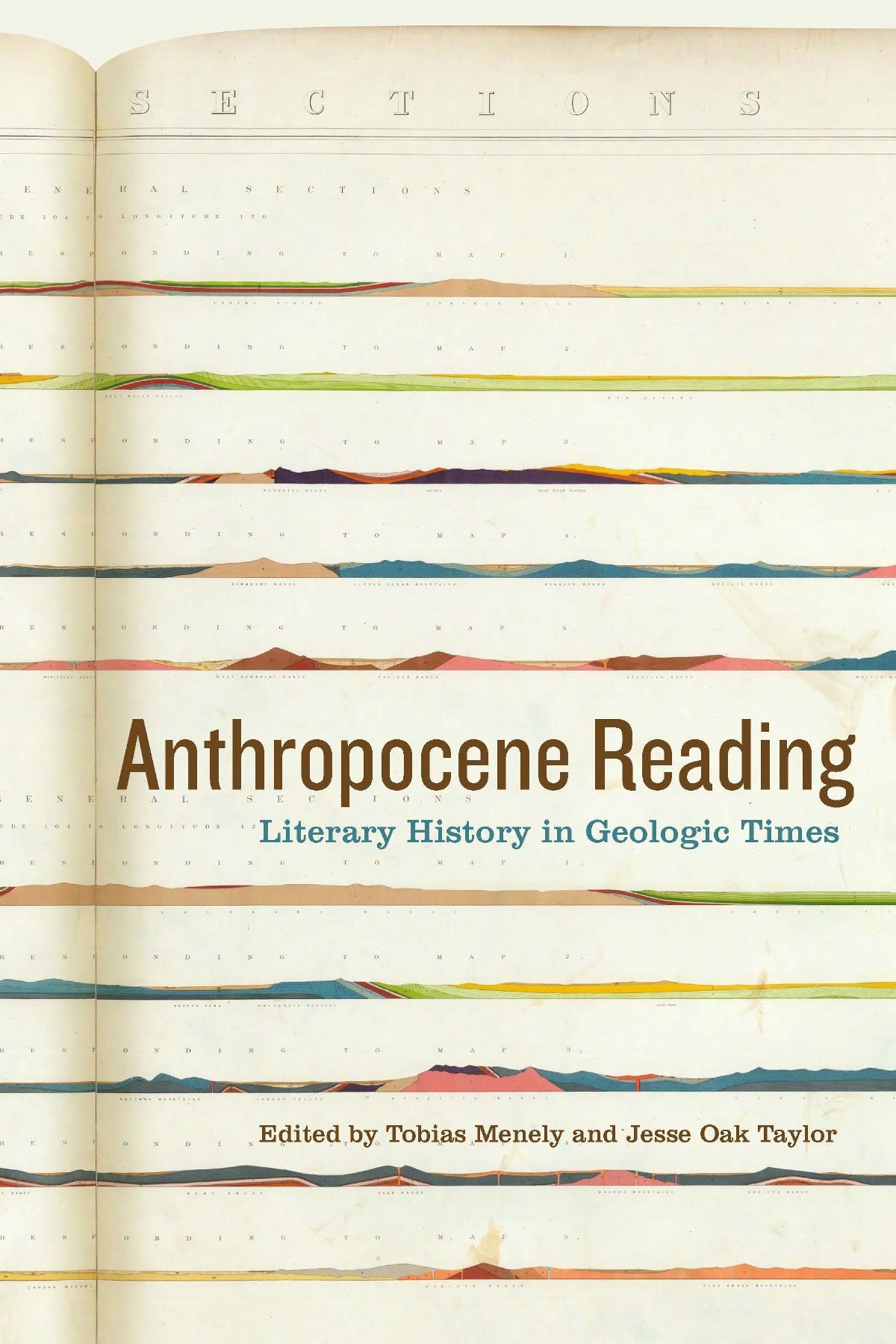

Lucinda Cole and Robert Markley, General Editors
Advisory Board:
Stacy Alaimo (University of Texas at Arlington)
Ron Broglio (Arizona State University)
Carol Colatrella (Georgia Institute of Technology)
Heidi Hutner (Stony Brook University)
Stephanie LeMenager (University of Oregon)
Christopher Morris (University of Texas at Arlington)
Laura Otis (Emory University)
Will Potter (Washington, D.C.)
Ronald Schleifer (University of Oklahoma)
Susan Squier (Pennsylvania State University)
Rajani Sudan (Southern Methodist University)
Kari Weil (Wesleyan University)
Published in collaboration with the Society for Literature, Science, and the Arts, AnthropoScene presents books that examine relationships and points of intersection among the natural, biological, and applied sciences and the literary, visual, and performing arts. Books in the series promote new kinds of cross-disciplinary thinking arising from the idea that humans are changing the planet and its environments in radical and irreversible ways.
Edited by Tobias Menely and Jesse Oak Taylor
The Pennsylvania State University Press
University Park, Pennsylvania
Library of Congress Cataloging-in-Publication Data
Names: Menely, Tobias, editor. | Taylor, Jesse O., editor.
Title: Anthropocene reading : literary history in geologic times / edited by Tobias Menely and Jesse Oak Taylor.
Description: University Park, Pennsylvania : The Pennsylvania State University Press, [2017] | Series: AnthropoScene: the SLSA book series | Includes bibliographical references and .
Summary: Considers the implications of the Anthropocene, the proposed geological epoch in which a human signature appears in the lithostratigraphic record, for literary history and critical method. Explores the status of reading in the history of geology, and of geohistory in literatureProvided by publisher.
Identifiers: LCCN 2017025913| ISBN 9780271078724 (cloth : alk. paper) | ISBN 9780271078731 (pbk. : alk. paper)
Subjects: LCSH: LiteratureHistory and criticismTheory, etc. | Ecocriticism. | Geology in literature.
Classification: LCC PN441 .A73 2017 | DDC 809dc23
LC record available at https://lccn.loc.gov/2017025913
Copyright 2017 The Pennsylvania State University
All rights reserved
Published by The Pennsylvania State University Press,
University Park, PA 168021003
The Pennsylvania State University Press is a member of the Association of American University Presses.
Tobias Menely and Jesse Oak Taylor
Jeffrey Jerome Cohen
Steve Mentz
Noah Heringman
Thomas H. Ford
Dana Luciano
Juliana Chow
Benjamin Morgan
Justin Neuman
Jennifer Wenzel
Matt Hooley
Derek Woods
Stephanie LeMenager
Anne-Lise Franois
Tobias Menely
Jesse Oak Taylor
In The Storyteller, Walter Benjamin proposes that we imagine the transformation of epic formsthe heroic epic, the fairy tale, the proverb, the legendas occurring in rhythms comparable to those of the change that has come over the earths surface in the course of thousands of centuries. Benjamin compares the long durations of geomorphological alteration, the gradual movement of uplift and sedimentation, to the drift of literary genres across history: There is hardly any other form of human communication that has taken shape more slowly, been lost more slowly (147). This incremental shape-shifting suggests a further implication of Benjamins analogy, related not to the scale of time but to its formal ordering, a likeness between lithic strata and the shaping power of narrative to organize time. Perhaps it is this formal intimacy with stone, this sense of the Earth as a primordial medium, that explains why, in Benjamins view, stories so often extend a ladder... downward to the interior of the earth (157), attending even to the mineral... the lowest stratum of created things (161). An alertness to the lithic as a narrative medium reflects back on human self-conception. The storyteller sees human eventuality in the mineral world, a natural prophecy of petrified, lifeless naturea prophecy that applies to the historical world in which he himself lives (161). In The Storyteller, Benjamin contrasts the epic forms, which convey distancethe vastness of the Earth, the amplitude of timewith the modern novel, which addresses readers who expect immediacy, information up to the moment and close at hand. Literary form thus has internalized modernitys accelerated tempo and so no longer echoes the dilatory rhythms and extended durations that Benjamin associates with geological time.
Though the dialogue between literary criticism and the Earth sciences rarely achieves the esoteric grandeur of The Storyteller, it is a persistent feature
Geology has long defined itself as a scientific discipline through a simultaneous disavowal and incorporation of literary modes, especially romance, the narrative form concerned with marvelous phenomena: enigmatic ruins, vast time scales, absent causes.
The literary dimensions of geologya practice of reading stratigraphic inscriptions and narrating evocative, if improbable, storiesbecome even more pronounced in the Anthropocene, the proposed geological epoch in which humans, collectively, have come to rival some of the great forces of Nature in [our] impact on the functioning of the Earth system.racean inscription written in the strataand then to decipher it (118). Such reading and narrating, however, need not await geologists from another world. The Anthropocene is, after all, not only an epoch in Earths geohistory defined by the shaping influence of human activity. It is also the epoch in which our singular species reads its transformative presence in the Earths strata, reads itself in the rocks, and in doing so establishes new stories about its identity and this planet.
When Paul Crutzen and Eugene Stoermer proposed the term Anthropocene in 2000, they dated it to James Watts 1784 patent on the double-acting steam engine. In selecting a global boundary stratotype section and point (GSSP), or golden spikea beginning, a spatiotemporal origingeologists give narrative shape to history.
The Anthropocene, however, has never been simply a term of stratigraphic relevance. Indeed, we can think of no concept that has resonated so widely, so quickly, across the disciplines in academia and in the popular press. It has inspired interdisciplinary journals, numerous articles, symposia, monographs, and cover stories in the Economist and the Guardian. We believe that scholars are debating the Anthropocene not because it names a clear-cut epoch in which social and geological history come into alignment, but rather because its implications productively unsettle conventional disciplinary modes of inquiry. Critiques that the Anthropocene is merely a fashionable buzzwordor worse, a term that naturalizes capitalism, imperialism, or social inequalitymay actually symptomatize the difficult intellectual burdens the Anthropocene imposes on us. In our view, the Anthropocene has inspired such intense debate, from the biophysical sciences to the humanities, because it identifies a problem, a problem of how emergent forms of causality, operating
Next pageFont size:
Interval:
Bookmark:
Similar books «Anthropocene Reading : Literary History in Geologic Times»
Look at similar books to Anthropocene Reading : Literary History in Geologic Times. We have selected literature similar in name and meaning in the hope of providing readers with more options to find new, interesting, not yet read works.
Discussion, reviews of the book Anthropocene Reading : Literary History in Geologic Times and just readers' own opinions. Leave your comments, write what you think about the work, its meaning or the main characters. Specify what exactly you liked and what you didn't like, and why you think so.

